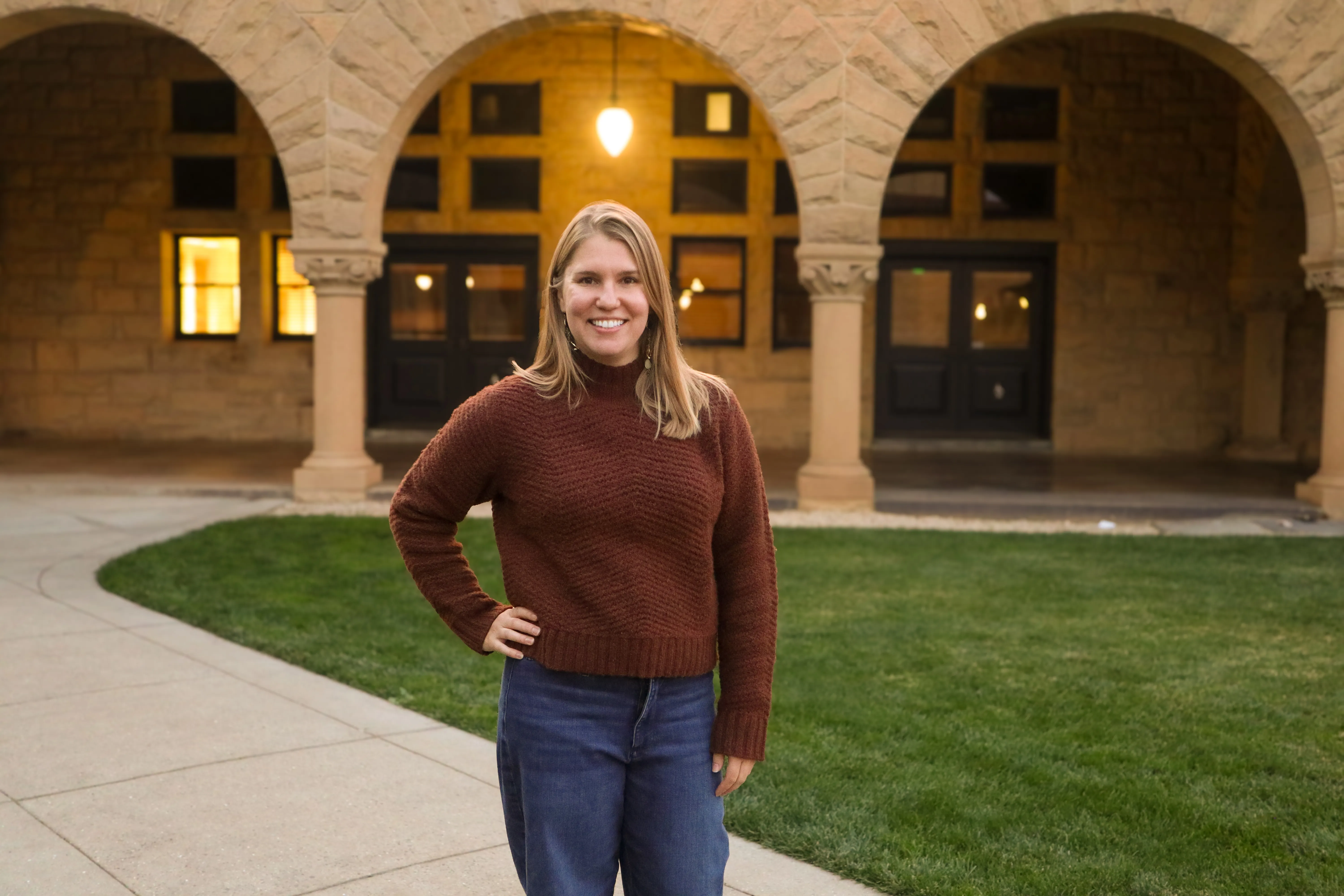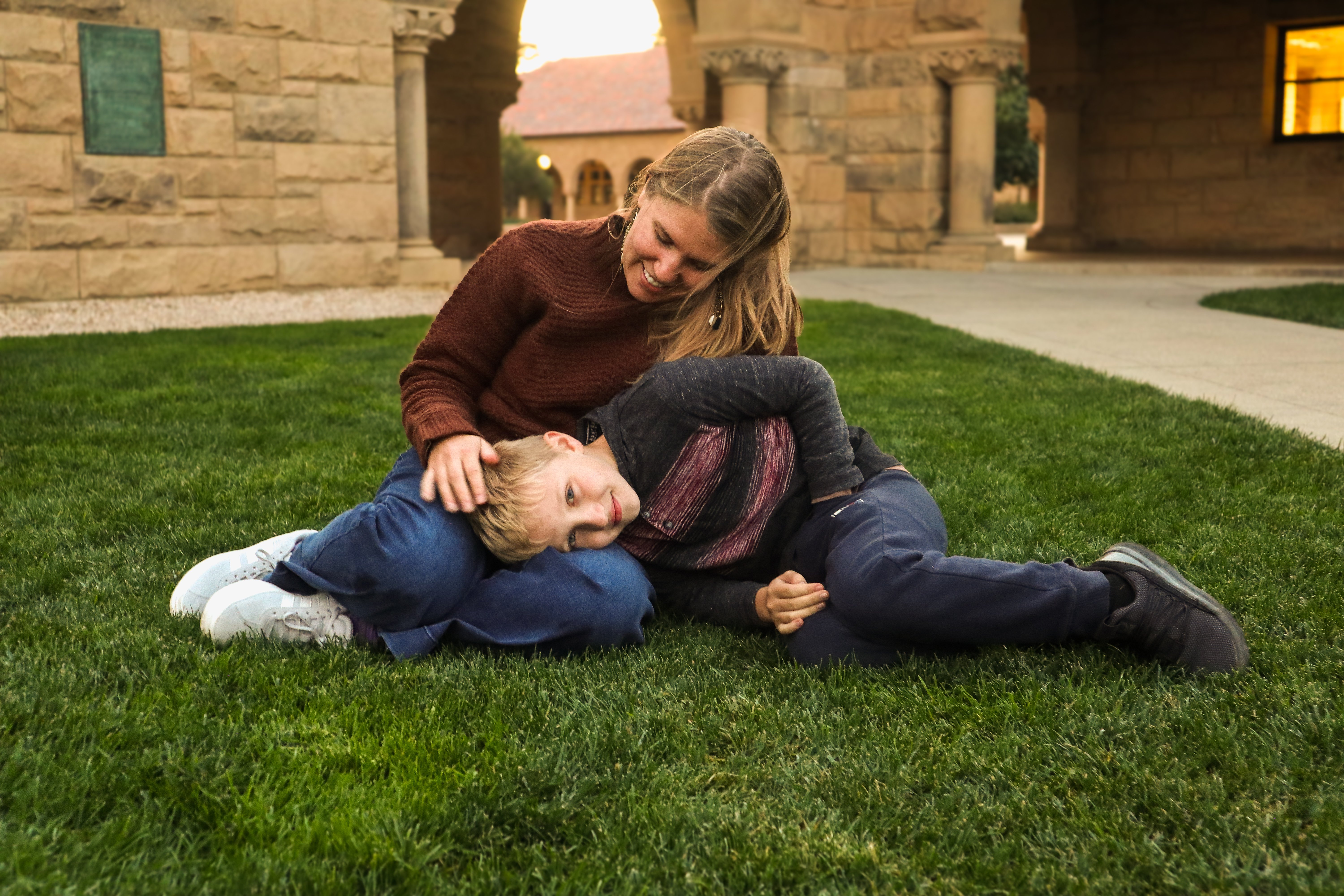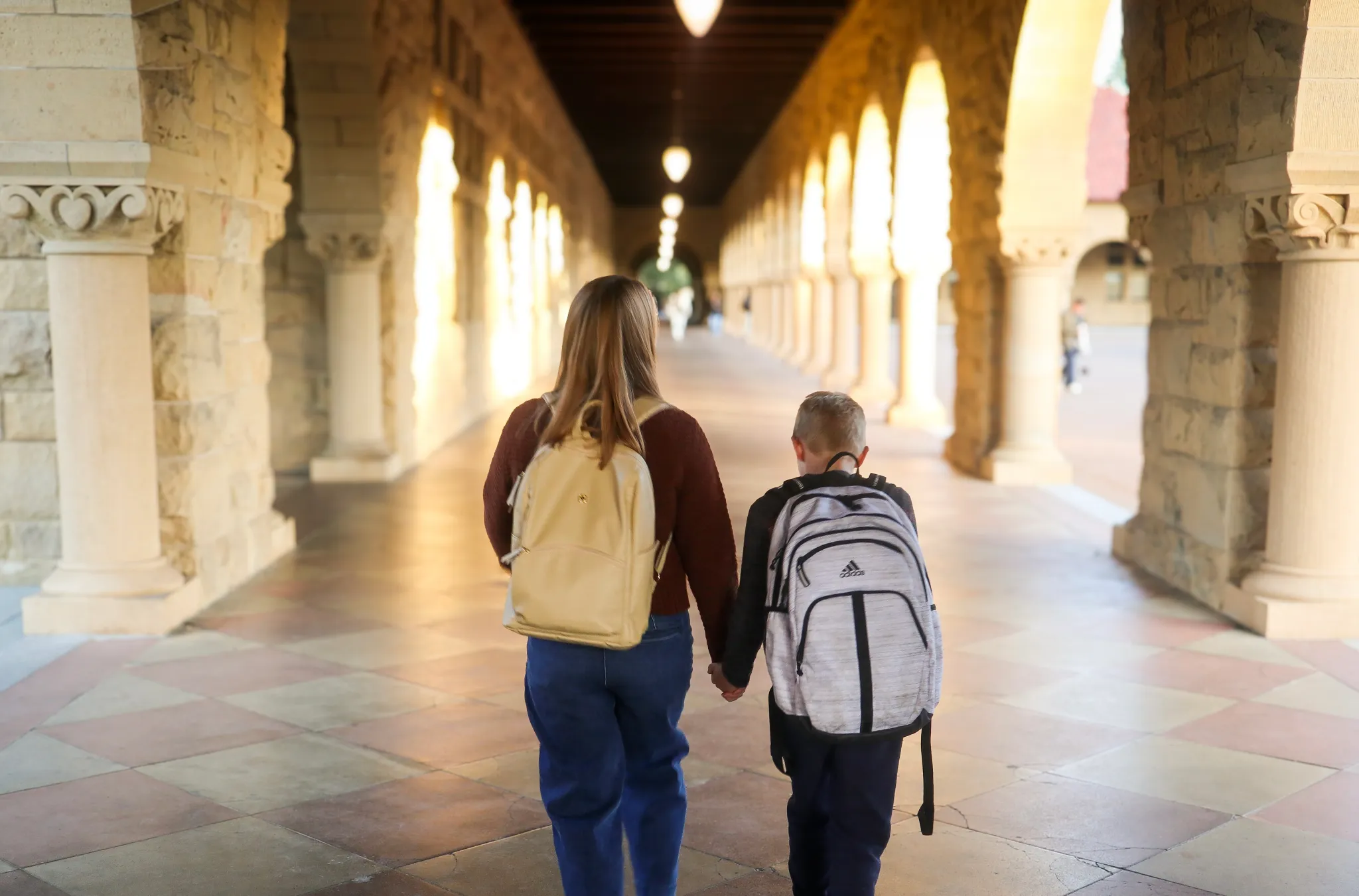On the night of the northern lights this past May, Carla Galaise ’27 sat down on her piano bench and braced herself. Earlier in the year, she had already received acceptance letters from two colleges in the New England area, both close to home. Now, she had one more letter to open: Stanford’s.
“I just threw my name in the hat,” Galaise said about her application to Stanford. When she got the letter, she expected to see a rejection and was prepared to move forward and commit to one of the two other colleges she had already been accepted to.
But then Galaise opened the letter.
“It was magical. I started crying, screaming and swearing,” Galaise said. Her son, Eli, ran in after hearing her and asked her “‘What happened? What’s wrong with you? What did you do?’”
Overcome with emotion, Galaise turned towards her 10-year-old son.
“Eli,” she said. “I’ve broken the cycle.”
A child bride at 17 and single mom in her thirties, Galaise joined the 2024 transfer class as the cohort’s oldest member and the only undergraduate residing in graduate family housing where she lives with Eli, who currently attends Escondido Elementary School.

Galaise’s journey began in a small town in rural Connecticut, where she grew up as a Jehovah’s Witness (JW). Galaise grew up with the same eight kids. Her childhood revolved around the church and she was largely isolated from the outside world.
“With the Witnesses,” Galaise said, “I was never allowed to get baptized because I asked too many questions.” Galaise recalls backlash for asking questions about things like the dinosaurs. “Witness culture is very conformist,” she said. “You don’t ask questions.”
In the outside world, Galaise would observe how her teachers interacted with her mother. JW elders often pulled her out of class because of the class content. She felt like an observer while in school, but had wanted to belong to the “educational world.”
Growing up, Galaise dreamed of becoming a clarinettist or going to college. To that end, she snuck out to take her SATs — the one and only time she snuck out during high school. But, according to Galaise, the arc of her life was long predetermined by the community’s elders.
At 17, Galaise said she was groomed to marry a high-standing ministerial servant six years older than her. Galaise’s first husband, however, was soon shunned from the community, and Galaise, having never been baptized, was cast out as well. Her first husband took a job at a grocery store in Vermont and brought Galaise with him. Before reaching adulthood, Galaise found herself 200 miles away from everything she’d ever known.
“He was abusive from the start,” Galaise said. They eventually divorced, but Galaise continued struggling to find a foothold. “I bounced from abusive relationship to abusive relationship. I ended up having a child with a different guy. I ended up in a domestic violence shelter, homeless, trying to get away from him.”
Soon, Galaise became a single mother. She began attending the Community College of Vermont, taking online courses and working a full-time job during the day.
Galaise felt “accepted” for the first time in community college, but she still faced a challenging schedule. After getting off from work everyday, Galaise would pick Eli up from daycare and rush home. She had two hours for dinner and quality time with him before she had to put him to bed. Galaise received minimal support from family during this period. Her mother was still a Witness and her siblings, she said, had “handled their upbringings in different ways.”

A few years later, when Galaise’s mother moved to Pennsylvania, Galaise and her son moved back to Connecticut. There, she transferred to Northwestern Community College, a college she’d driven past numerous times as a child, but had always seemed “out of reach” to her.
At Northwestern, Galaise served as the elected chair of the state’s Board of Regents Student Advisory Committee, representing 40,000 students. Galaise further immersed herself in her community as a peer mentor, helping new students transition to the college environment.
Off campus, Galaise interned for a semester with Connecticut State Representatives Robyn A. Porter and Andre Baker Jr. at the State Capitol, where her story contributed to Connecticut’s bill that banned child marriage. During her internship, Galaise also spent time with various House Democrat legislative aids and committee clerks.
By the time Galaise left Northwestern, she had left an immense impact on the lives of fellow students, wrote Mike Rooke, the President of Northwestern Community College.
“Her drive and commitment to first her son and then herself, are striking, and exemplify the resilience of the community college student. Her willingness to give back to benefit other students is remarkable,” Rooke wrote to The Daily.
On top of a full ride from Stanford, Galaise was also awarded the Jack Kent Cooke Foundation Undergraduate Transfer Scholarship.
Galaise said she has thought a lot about her acceptance into Stanford, especially since she didn’t feel like she ever belonged to one group.
“Now that I’m here, I think I’m seeing that that’s why Stanford picked me: I’m not afraid to be in any part of a group. And I’m eternally grateful that Stanford believes in me,” Galaise said.
Galaise was previously living in unsafe housing, struggling for food and advocating for the bare minimum. Now, she looks forward to the upcoming years at Stanford where she won’t have to worry about her basic needs being met.
“I can go to any of the dining halls and have coffee and food. I am so excited to be in a place where I can prioritize my health, which is something I’ve never ever been able to do and it’s extraordinary,” Galaise said.
Terrence Cheng, the chancellor of the Connecticut State Colleges and Universities (CSCU), wrote that at Stanford, Galaise will find new doors to open.
“Academically, personally and professionally, she is going to meet people and have experiences that are going to catapult her to even greater heights,” Cheng wrote to The Daily.

Although Galaise started at Stanford with anthropology in mind, she is now opening up to new directions and interests, ranging from social psychology to political science. Her interests have largely been inspired by her three current classes she’s been taking: PSYCH 30N: “The Science of Diverse Communities,” PSYC 54N: “Genes, Memes, and Behavior” and RELIGST 19Q: “Does Religion Divide Us.”
Claude Steele, a professor of psychology who teaches PSYCH 30N, wrote Galaise is “both curious about classmates’ experiences and background and able to bring to perspectives that otherwise wouldn’t be part of the discussion.”
Similarly, David Tomz ’28, a classmate in Galaise’s PSYC 54N class, wrote that “while most of the students could reflect on how their parents treated them growing up, Carla, being a mother, shared the other point of view.”
“I thought this was super interesting and something I would never hear from the typical undergraduate,” Tomz wrote to The Daily.
Scott Hall, a professor of psychiatry and behavioral sciences, who teaches PSYC 54N said, Galaise contributed to the class’ discussion by drawing on her own life experiences, especially in the class debate on nature vs. nurture.
Classmate Aurelia Leowinata ’28 also recalled Galaise’s insights into early behavior intervention for obsessive-compulsive disorder (OCD) with Eli and how the different cultures from the communities they lived in changed his perspective.
Likewise, in RELIGST 19Q, another of Galaise’s IntroSems this quarter, classmates noted that they look forward to her questions. Gabriella Zannis ’28 described how Galaise openly shares her life experiences with religion, which add invaluable insights to class discussions.
Lara Franciulli ’25 noted Galaise’s insights on “whether tailoring laws around religion to more moderate perspectives would truly be fair and impartial to everyone.”
Galaise said she was looking forward to her future at Stanford.
“Whatever my future is, there’s no way I could imagine it three years ago. I could never imagine being here and everything that’s happened in between,” Galaise said. “I want to publish a book that I’ve been working on for a long time; I want to run for office one day; I want to gain the knowledge I need to make a difference in this world.”
Galaise’s excitement not only comes from herself and her school communities. Above all, it comes from Eli. Galaise recalled a conversation with her son while she was on the fence about her current courses in human biology. “I was at the dinner table with Eli and he’s like, ‘Mom, you came here to learn more and it’s for knowledge. So what do you wanna learn about?’ And he just said it so simply,” she said.
Her son’s sage advice is helping her make the decision every undergraduate sophomore must make: what to declare as her major.
“A human biology degree is probably more lucrative than anthropology or anything I decide to choose, but it’s not about that. I just want to make enough to survive. It’s about the knowledge,” Galaise said.
Galaise believes there’s no place like Stanford for her pursuit of knowledge.
“The education here is mind-blowing, just what’s at our fingertips,” she said. “I meet so many students who have so much pressure from their families, and on the one hand, it helps me appreciate in a way that I have the freedom to do whatever the heck I want to. Now actually at Stanford, I need to make the most out of this.”
A previous version of this article misstated that Scott Hall was a professor of psychology and teaches PSYCH 54N. Hall is a professor of psychiatry and behavioral sciences and teaches PSYC 54N. The Daily regrets these errors.
